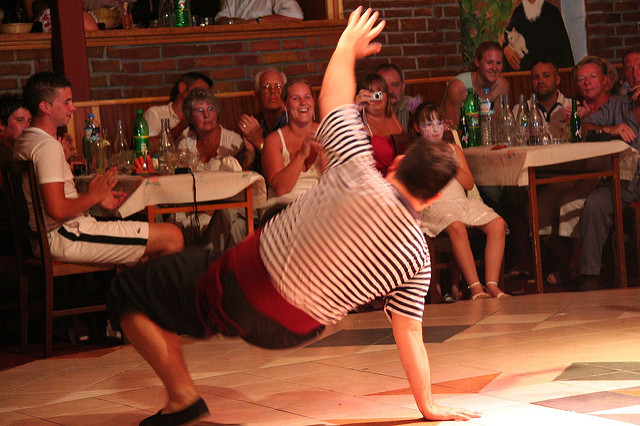
“I should learn to run, to wrestle, to swim, to ride horses, to row, to drive a car, to fire a rifle. I should fill my soul with flesh. I should fill my flesh with soul. In fact, I should reconcile at last within me the two internal antagonists.” ~ Nikos Kazantzakis, Zorba the Greek
I closed the latest self-help book I was reading. While its central message had offered me joy, a lingering voice inside kept saying, “burn all your books—go out and live life instead!”
I’ve based my life on learning and reading, and I know how central they have been to my growth. Deep in my core, I crave to experience more. There is a balance to be had in our lives—a time to read the books and a time to burn the books.
There is cowardice and comfort in reading and learning without daring greatly, and there is shallowness in living a completely sensual, experiential life. Hemingway in his earlier years was my hero because he was a man of action who wrote based on his life experiences and not imagination.
“…there is only one life for all men…there is no other…all that can be enjoyed must be enjoyed here.”
In Nikos Kazantzakis’s Zorba the Greek, Zorba is the larger-than-life character who was passionate, fearless and always lived in the moment. He was illiterate and yet ingenious and profoundly more philosophical in his daily teachings than any book or self-help guru could be.
These are the seven lessons I’ve learned from Zorba:
1. Life is the ultimate teacher.
“What a miracle life is and how alike are all souls when they send their roots down deep and meet and are one!”
Living life to its fullest with passion and free of expectations will ultimately teach us more than anything or anyone can. When we start living authentically without the obstacles that teachers and books often unknowingly put before us, we start moving toward that feeling of awe. We were born to experience!
Zorba was free of social conventions and embodied living a life with a deep feeling of awe, gratitude, and wonder. For him, life was about living and experiencing the sensual joys of life, he was the antithesis to the learned and the scholarly and railed against the “pen pushers.”
He stripped himself of his inhibitions and allowed his heart to lead him to the mysteries of life. He recognized that he would not live life through his mind but rather allow life to live through him.
2. Be foolish.
“Every man has his folly, but the greatest folly of all, in my view, is not to have one.”
How many times do we overthink ideas, procrastinate on doing things we love because reason outweighs intuition? Acting spontaneously and being foolish gives us our greatest memories and most pleasurable experiences.
Zorba was foolish in approaching “the boss” and asking him for a job while they were sitting with other passengers and explaining that the reason he lost his last job was for hitting his last boss. His honesty and resourcefulness impressed “the boss” and he was hired.
3. Death is one certainty of life, so embrace it.
“Act as if death did not exist, and act with death in mind at every moment…” and “…I look on death every moment and I’m not afraid; yet I never say I like it. No, I don’t like it at all! Am I not free? I refuse to sign up!”
When we live as if death is perched on our shoulders, we start embracing the fullness of life. We wake up every day, marvel at life and feel grateful for the things we usually take for granted.
4. Adversity leads to growth.
“Life is trouble. Only death is not. To be alive is to undo your belt and look for trouble.”
Adversity is our greatest teacher. Only when our backs are against the wall, do we start discovering our core strength. We need life’s challenges and obstacles to help push us out of our comfort zones and dig deep into our inner selves and learn the lessons that temper our soul.
Like they say, the stormy seas really do make skilful sailors.
Zorba had fought in many wars for his country, Greece. He watched and was involved in many atrocities. He left the army and spent years travelling and meeting many people all over Europe, which made him stronger and his life richer.
5. Be here now.
“God changes his appearance every second. Blessed is the man who can recognize him in all his disguises.”
Life is happening right now. The present moment is where our true essence lies and where eternal brilliance prevails.
Zorba’s day would start afresh without holding onto what happened yesterday. He would hold onto memories as treasures hoping to share with friends and talked about his dreams as if they were inspiring him rather than holding him back. He cried when he was sad, laughed when happy and worked hard when he had to put food on the table. He played the santuri and sang when his heart so desired. He lived entirely in the present.
6. Embrace simplicity.
“I felt once more how simple and frugal a thing is happiness: a glass of wine, a roast chestnut, a wretched little brazier, the sound of the sea. Nothing else.”
As Leonardo Da Vinci said, “Simplicity is the ultimate sophistication.” Inner peace resides in simplicity and joy in doing the simple things of life.
If we listen closely to our hearts, there is an inherent urge in us to simplify our lives. Fewer decisions mean less energy spent. And so instead of more, let’s choose less—it can help us focus, engage and enjoy those valuable things more.
Zorba embodied the simple life by working in the mines when he needed money and didn’t work when he had money. He enjoyed the simple things of life; food, wine, and music. He would turn his food to “work and good humor” rather than most people who would turn their food into “fat and manure.”
7. Freedom is man’s natural state.
“No, you’re not free…The string you’re tied to is perhaps no longer than other people’s. That’s all. You’re on a long piece of string, boss; you come and go, and think you’re free, but you never cut the string in two. And when people don’t cut that string…”
Our ultimate goal as human beings is to be free and yet we allow ourselves to cling to every form of enslavement possible. Can we remove the shackles that we have put on?
Our greatest triumph would be to free ourselves completely and go back to those days when we were free of guilt, fear, and worry. We were born free, and it’s to that state we must return.
Zorba epitomised freedom, especially when dancing. He would communicate in a language that didn’t include words and yet his message was beautiful, simple and more diverse than words ever be.
True joy doesn’t come from things but from the realization that we are here to experience every moment of life—the good, the bad and the ugly. That is the only way that we can be in touch with our true selves and say that we’ve lived a meaningful life.
~
Author: Mo Issa
Editor: Renée Picard & Katarina Tavčar
Photo: Irene./Flickr








Read 0 comments and reply